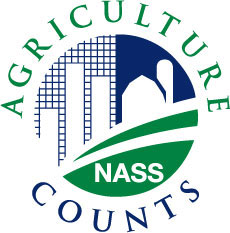
Western Iowa was the recipient of some much-needed precipitation this week. Farmers, statewide, had 5.3 days suitable for fieldwork during the week ending July 9, 2023, according to the USDA, National Agricultural Statistics Service. Field activities included cutting hay and spraying crops. Some reports were received of farmers beginning to harvest oats for grain.
Topsoil moisture condition across Iowa rated 15 percent very short, 42 percent short, 42 percent adequate and 1 percent surplus. Topsoil moisture condition in west central Iowa rated 22 percent very short, 39 percent short, 37 percent adequate and 2 percent surplus. A week ago, 67 percent of west central Iowa was very short or short.
Subsoil moisture condition statewide rated 19 percent very short, 45 percent short, 35 percent adequate and 1 percent surplus. Ratings in west central Iowa were 31 percent very short, 39 percent short, 28 percent adequate and 2 percent surplus.
Corn silking hit 22 percent this week, six days ahead of last year and two days ahead of the 5-year average. Some reports were received of corn starting to dough. Corn condition remained steady at 61 percent good to excellent.
Forty-six percent of soybeans were blooming, five days ahead of last year and three days ahead of the average. Soybeans setting pods reached 7 percent, four days ahead of last year and one day ahead of normal. Soybean condition rated 52 percent good to excellent.
The state’s second cutting of alfalfa hay reached 58 percent complete, nine days ahead of last year and 1 week ahead of the average. Hay condition improved slightly to 35 percent good to excellent. Pasture condition rated 24 percent good to excellent. Livestock producers continued to supplement with hay as pasture conditions remained below average.
Weather summary provided by Justin Glisan, Ph.D., state climatologist, Iowa Department of Agriculture and Land Stewardship – Showers and thunderstorms produced widespread rainfall through the reporting period with pockets of near-normal to above-average totals in western, northeast and southeast Iowa; some stations measured one to three inches of above-normal amounts. The rest of the state had rainfall deficits in the 0.50-1.00-inch range. Temperatures were also unseasonably cool with negative departures of as much as seven degrees northwest; the statewide average temperature was 68.8 degrees, 5.5 degrees cooler than normal.
Showers cleared eastern Iowa through Sunday afternoon, July 2, as mostly clear conditions and highs in the low to mid-80s were reported across much of the state. Calm to light, variable winds continued overnight into Monday with morning lows in the low to mid-60s and reports of patchy fog southwest and southeast. Southwesterly winds increased through the day with daytime temperatures rising into the upper 80s and low 90s under sunny skies. Spotty thunderstorms, some severe-warned, fired in northwestern Iowa later in the afternoon before dissipating after sunset.
Another round formed after midnight in northeastern Iowa. Rain totals at 7 am on Tuesday, July 4, were more than 0.50 inch at 10 stations with Oelwein (Fayette County) observing 1.15 inches while Strawberry Point (Clayton County) measured 1.29 inches. Showers associated with an approaching low-pressure system pushed into the northwest corner just before noon where daytime highs held in the 70s, while upper 80s and low 90s were observed farther east. As the low’s attendant cold front moved over the Nebraska border, severe thunderstorms formed but lost strength over the next few hours as fireworks streaked across the sky. Widespread rain totals above 0.25 inch were reported in western Iowa with higher amounts ranging from 0.73 inch at Rock Rapids (Lyon County) to 2.26 inches in Mapleton (Monona County).
Thunderstorms dissipated as the front moved through central Iowa into Wednesday morning but refired stronger storms along the Iowa-Illinois border in the early afternoon; Burlington (Des Moines County) registered 0.79 inch while Salem (Henry County) collected 1.11 inches. Northerly winds built in behind the front along with cooler high temperatures in the 70s.
Thursday, July 6, started with morning lows in the mid-50s northwest to mid-60s southeast under clear skies with a light, northerly wind. Partly cloudy skies developed into the afternoon hours with pleasant highs in the 70s. Clouds increased over western Iowa close to sunrise on Friday as another low-pressure center approached from Nebraska. A broad area of showers and thunderstorms developed and pushed across Iowa for the remainder of the day. Temperatures were unseasonably cool statewide with upper 50s to mid-60s west to east. Most of Iowa’s stations reported measurable rainfall with widespread amounts in the 0.25-0.75-inch range in western and southern Iowa; peripheral stations measured a tenth or two with a statewide average of 0.23 inch. Burlington and Salem again received totals over an inch, registering 1.65 inches and 1.97 inches, respectively.
Fog formed overnight into Saturday, July 8, as winds shifted to the northwest with daytime conditions reaching into the mid to upper 70s under mostly sunny skies. Winds died down and became variable after sunset with isolated clouds moving across southern Iowa. Sunday morning saw a wide range of temperatures from spotty upper 40s in northwest Iowa to low 60s in eastern Iowa.
Weekly rain totals ranged from no accumulation at several north central stations to 3.11 inches in Salem. The statewide weekly average precipitation was 0.64 inch, while the normal is 1.07 inches. Sioux City Airport (Woodbury County) reported the week’s high temperature of 96 degrees on July 3, 11 degrees warmer than normal. Vinton (Benton County) reported the week’s low temperature of 42 degrees on July 7, 18 degrees cooler than normal.
